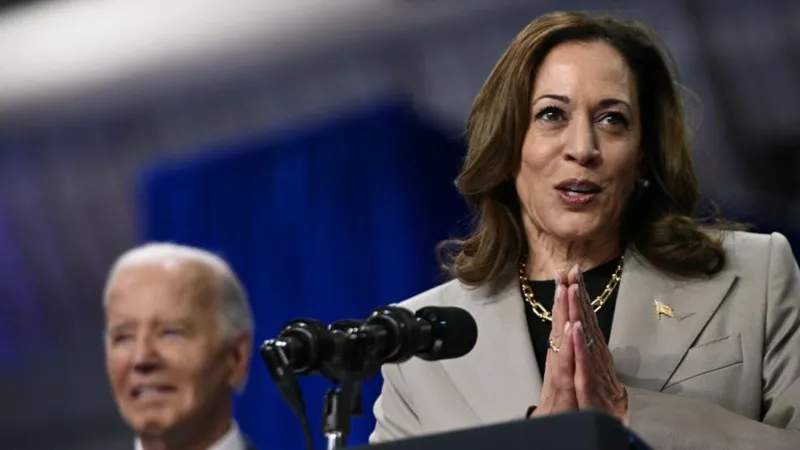International
US Election Campaign: Kamala Harris Lays Out Economic Plan

Vice President Kamala Harris has unveiled an ambitious plan aimed at addressing the housing crisis, economic challenges faced by families, and corporate practices.
Her proposals include building millions of new homes, expanding tax relief for families with children, offering new down payment assistance for first-time homebuyers, and implementing a national ban on grocery price gouging.
These policies were announced as part of her presidential campaign on Friday, just before she headed to North Carolina to deliver a speech on the economy.
Harris’s plan builds on initiatives from the Biden administration and seeks to address concerns about the economy, particularly in the wake of rising prices since 2021.
However, many of these proposals would require congressional approval, where similar efforts have previously stalled.
Donald Trump, Harris’s chief rival, has criticized her proposals, emphasizing his plan to lower costs by boosting oil and gas drilling. “Where has she been and why hasn’t she done it?”
Trump remarked to the press on Thursday. “I hear that complaining all the time.”
Despite Trump’s criticisms, Democrats are positioning Harris as a more assertive advocate on economic issues compared to President Biden.
Robert Weissman, co-president of the consumer watchdog Public Citizen, praised Harris’s approach, saying, “The details are going to matter … but putting all these policies together, it’s not just a strong anti-inflation agenda, it’s a strong pro-consumer, anti-corporate abuse agenda and I think that’s potentially very powerful.”
Among the campaign’s proposals is a novel tax credit for builders of homes intended for first-time buyers, along with up to $25,000 in down payment assistance for eligible buyers.
Harris’s team estimates this could help 4 million households over four years. She also advocates for legislation that would limit tax benefits for large landlords and prevent property owners from using services that manage rental prices.
Harris is also pushing for a $35 cap on insulin prices, strategies to eliminate medical debt, and a $6,000 tax credit for families welcoming a new child.
According to Weissman, Harris is adopting a more aggressive stance than Biden, especially in her support for a federal ban on grocery price gouging.
EDITOR’S PICK:
- NYSC Revokes Certificates Of 101 Mobilized Individuals
- ‘Harris Crowd Was Faked’ – Trump Claims
- Ukraine Destroys Russian Submarine in Crimea
“The administration did talk about it but they did not promote proposed measures anywhere near as aggressive as Harris is doing,” he observed.
Harris’s focus on consumer protection and corporate accountability reflects her tenure as California’s attorney general, where she secured significant settlements from mortgage servicers after the 2008 housing crisis, targeted for-profit colleges, and held oil and gas companies accountable.
This approach is meant to contrast sharply with Trump’s record, which has been marred by criminal charges and a laissez-faire attitude toward environmental and labor regulations.
Political analysts suggest that Harris’s campaign has an opportunity to reshape the narrative around the cost of living, though pollster Micah Roberts, from Public Opinion Strategies, cautions that it will be a tough battle.
“Trump’s been holding the advantage on this stuff for like a year plus,” Roberts noted, adding that it would be difficult to close the gap without a significant shift in the political landscape.
Trump’s campaign has dismissed Harris’s proposals, labeling them the work of a “radical left lunatic.” While some analysts acknowledge that measures like the price gouging ban could resonate with voters, others warn of potential pitfalls.
Existing price gouging laws in many states are typically enforced during emergencies, such as natural disasters, and expanding these regulations could unintentionally harm the market by discouraging production during shortages.
Michael Salinger, a professor of markets, public policy, and law at Boston University, criticized the price gouging proposal, recalling a similar debate during his time as the lead economist at the Federal Trade Commission under President George W. Bush.
“I thought then that it was a bad idea and I think now that it’s a bad idea,” Salinger said. “To impose controls on competitive markets will lead to shortages – that’s always been our experience.”
Salinger also questioned the financial feasibility of Harris’s other initiatives, particularly the plan to increase the child tax credit, which Congress temporarily expanded during the pandemic. Some estimates suggest this could cost over $1 trillion.
Skepticism extends to Trump’s economic strategies as well. Economists argue that increased oil drilling would have minimal impact on global energy prices, and they caution that Trump’s proposed import tax could drive up costs.
While inflation has been easing, with a July rate of 2.9% marking the smallest annual increase since March 2021, prices remain approximately 20% higher than they were in January 2021.
“The problem that people object to is that even if inflation is down, the prices are still higher and that’s true but they’re higher because of the natural working of market forces,” Salinger explained.
“Trying to stand in the way of the working of market forces is a lot like trying to stop the tides. You just can’t do it.”
CLICK TO WATCH OUR VIDEO OF THE WEEK
Advertise or Publish a Story on EkoHot Blog:
Kindly contact us at ekohotblog@gmail.com. Breaking stories should be sent to the above email and substantiated with pictorial evidence.
Citizen journalists will receive a token as data incentive.
Call or Whatsapp: 0803 561 7233, 0703 414 5611







